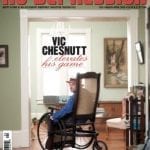Hello Stranger from Issue #56
I first met Vic Chesnutt in early 1991. He was coming through Austin, where I lived at the time, to play a show at the local alt-rock club, and I’d done a phone interview with him to preview the show for the daily paper. As it happened, my roommate at the time, Wammo (now the ringleader of the Asylum Street Spankers), was a friend of Vic’s, so we all went to dinner before the show at Sam’s, a legendary eastside barbecue joint. I remember Chesnutt curiously eyeing the photos on the wall of Stevie Ray Vaughan and other Austin blues greats, and I still recall some of the things he said in that phone interview. (He insisted the car crash that put him in a wheelchair made him a better guitarist: “I played too damn jazzy back then.”)
There was a song he was playing then that never ended up on a record, yet I can still remember it quite clearly. It was called “Critic’s Darling” and it was a snapshot of what he’d been going through in the wake of the attention his debut album had received. “Some say ‘Keep it minimal’/Some say ‘Get an orchestra’,” he related, acknowledging that even his “benefactor” (Michael Stipe) was hounding him: “He says ‘Your new album’s about due’/I said ‘I haven’t got a clue.'” Vic summed it up in the chorus: “This could be the end of me, though I’m just barely starting/Everybody loves to hate the critic’s darling.”
How many songs that you heard just a couple times, songs that never ended up on a record, can you remember vividly more than a decade later? I believe this says something about the weight of Chesnutt’s delivery, and his personality.
We inevitably crossed paths again at various times over the years, and most of those occasions somehow stick out in my mind. I moved to Seattle in late 1991 and Vic came through in mid-’92; few people seemed to know who he was, but by the time he left town after shows at the Crocodile and the Backstage, he’d left a lasting impression among those who saw him, particularly fellow musicians.
I took it upon myself to harangue Grant Alden, managing editor of The Rocket, to allow me to become a sort of serial reviewer of Vic’s catalogue over the next couple years, from West Of Rome to Drunk to Is The Actor Happy to Nine High A Pallet. Looking back at them now, not my finest work, though I do still have a fondness for this assessment of Drunk: “Chapter three, in which our hero (mine, anyway) continues his quest to charm and/or annoy the music-buying public with songs that could only have oozed from his hopelessly, gloriously warped lil’ noggin.”
Then there was the time a couple years later when Chesnutt was scheduled to play a show at the Crocodile. Scott McCaughey and I were sitting in the club’s restaurant when we saw Vic pull up in his van. Driving, by himself. The guy in the wheelchair was touring across the country completely solo. I still can’t quite comprehend how he pulled that off.
Somewhere in there, I did another phone interview with him, and he talked about how he’d recently written a letter to the city of San Francisco in defense of the nightclub Slim’s, which was facing stiff penalties for not meeting handicapped-access regulations. “It was gonna cost $150,000 to get it up to code….That’s just berserk. That’s crazy. If the place catches on fire — so I die. You know, big deal. It’s better that I die so that San Francisco can rock!”
I bring up all these memories not simply to reminisce about the good ol’ days, but perhaps to try to underscore why Vic Chesnutt is on our cover. Yes, it’s been nearly a decade since his profile peaked with that Sweet Relief tribute disc and his brief tenure on Capitol. Yes, there are newer and younger and hotter artists we could put out front, ones who might be wiser choices in terms of newsstand sales.
But Vic has a history in our little world. Not only a history, but a story to tell, and he does so with rare and brazen honesty and insight. It says quite a bit that we had William Bowers write at length about Chesnutt for us a couple years ago, and now have Bob Townsend writing a cover story about Vic in this issue, without retracing steps already taken. This is an artist whose life and work are intriguing and uncommon enough to warrant the continued attention. Critic’s darlings be damned.




